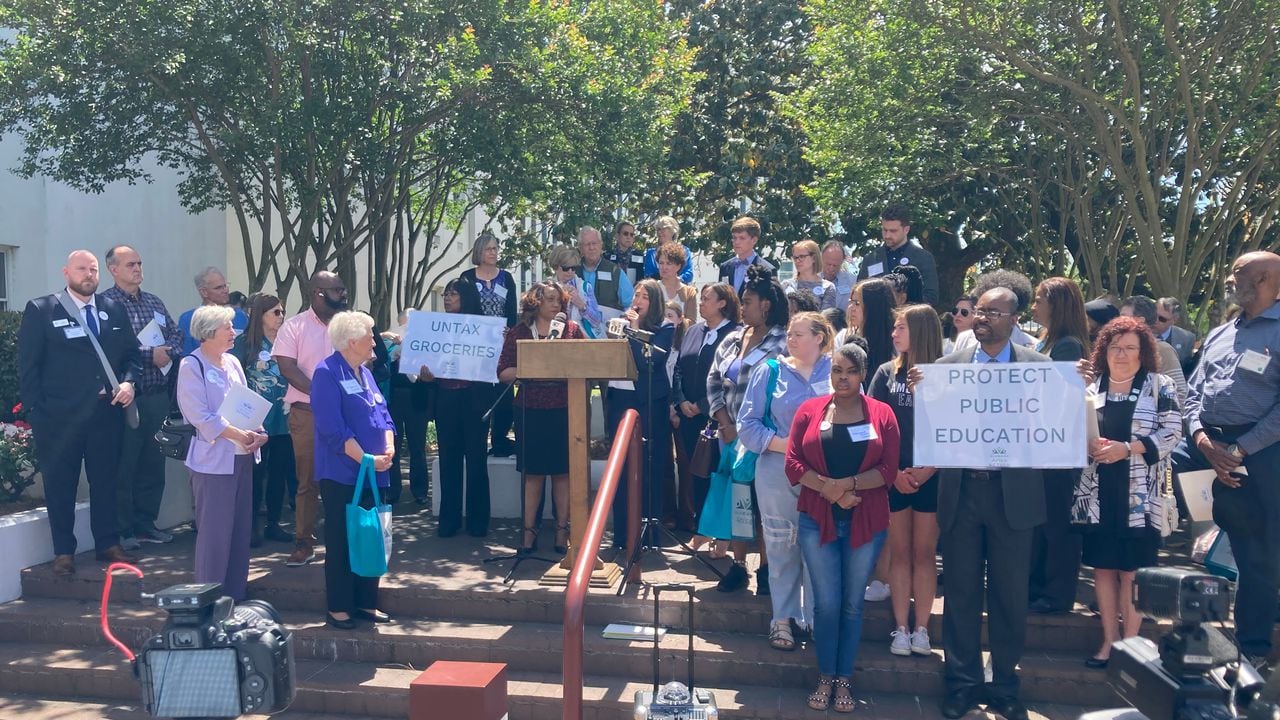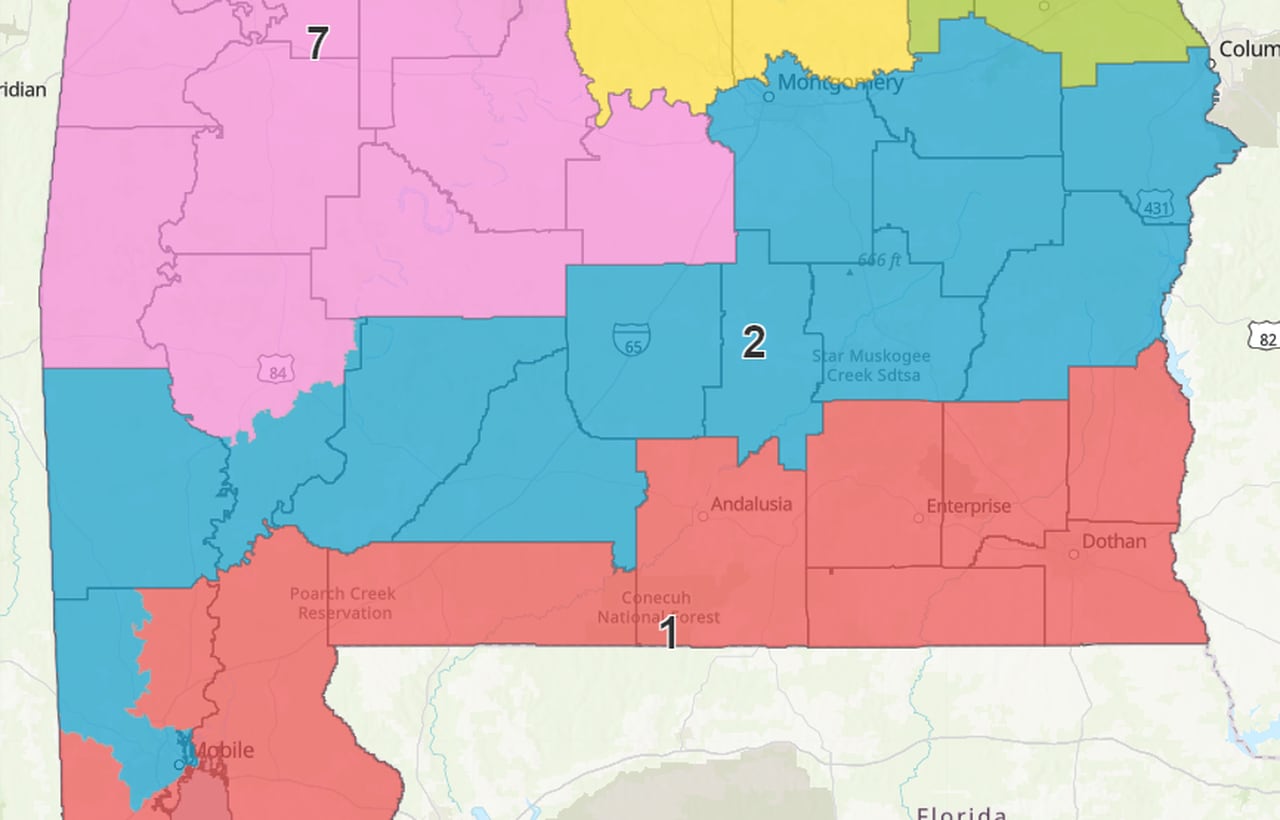By Mike Cason
(AP Photo/Allison Dinner)
For decades, Alabama lawmakers heard calls from advocates and from some of their own leaders to end or reduce the state sales tax on food.
Alabama Arise, which lobbies for policies that help low-income families, and lawmakers such as former Rep. John Knight, a longtime state budget chairman from Montgomery, called for ending the tax because of its disproportionate burden on low-to-middle income households. Alabama was one of only a few states that fully taxed food.
Bills to reduce the tax came and went but usually received little attention, mostly because of concerns about losing the revenue, which supports public schools.
That changed this year. The Legislature, presented with an unusual surplus for state budgets, overwhelmingly passed a bill to reduce the tax, and Gov. Kay Ivey signed it into law. It was only an incremental step, initially reducing the tax by 1 percentage point, but still ranks as one of the most meaningful accomplishments of the year.
The favorable budget outlook this year influenced other legislation. Lawmakers passed a bill to exempt overtime pay from the state income tax. And they approved a one-time income tax rebate.
The surplus funds were the result, at least in part, of the billions of federal dollars poured into Alabama and other states in response to the pandemic.
In March, Alabama lawmakers passed a bill to spend $1 billion of those federal funds, Alabama’s final round of money from the American Rescue Plan Act (ARPA).
In contrast to the bipartisan consensus on the tax-relief bills, lawmakers split bitterly this year on their mandate to redraw the state’s congressional districts after the U.S. Supreme Court found that Alabama’s map likely violated the Voting Rights Act.
The Legislature renewed and expanded the laws Alabama uses as incentives to recruit industry, a move officials said was necessary to keep Alabama competitive.
As in most years, lawmakers passed bills intended to crack down on certain crimes.
And they acted on another initiative that, like the grocery tax, had been talked about for years, passing a bill to authorize construction of a new State House.
Food tax cut
HB479 by Rep. Danny Garrett, R-Trussville, reduced the 4% sales tax on food to 3% effective Sept. 1.
The tax could go down to 2% on Sept. 1, 2024. But that cut will not take effect unless the state’s Education Trust Fund has grown by 3-1/2% over the previous fiscal year. Lawmakers included that provision to protect the school funds, since sales tax dollars are a key source of revenue.
Alabama Arise estimated that the typical family would save about $150 a year because of the reduction to 3%.
The food tax bill passed without a dissenting vote.

Overtime tax exemption
Starting Jan. 1, full-time hourly workers in Alabama will pay no state income tax on overtime pay, defined as pay for work in excess of 40 hours in a week.
The new law equates to a 5% raise on pay for work over 40 hours a week for full-time hourly employees, because that’s the rate of the state income tax.
House Minority Leader Anthony Daniels, D-Huntsville, came up with the idea and sponsored the bill. In addition to helping workers who will be taking home more of their pay, Daniels said the exemption will help employers because it will encourage work and productivity at a time when there is a shortage of workers.
Tax rebate
Gov. Ivey proposed a state income tax rebate of $400 for individuals and $800 for couples filing jointly during her State of the State address in March.
The Legislature reduced it, as some lawmakers said they preferred to focus on a permanent tax cut instead of the one-time rebate. After different versions passed the House and Senate, lawmakers eventually settled on rebates of $150 for individuals and $300 for couples.
The Alabama Department of Revenue begin issuing rebates Dec. 1 by direct deposit or check.
Redistricting
The Legislature passed a new congressional district map in 2021, as it must do after every census. It was essentially the same map used since 1992, with one majority Black district and six that were heavily white.
Organizations and Black voters filed lawsuits challenging the map, arguing in part that it was unfair to Black voters because Black residents make up one-fourth of the state’s population but have a chance to elect their preferred candidate in just one of the seven districts.
In January 2022, a three-judge federal district court ruled that the map likely violated the Voting Rights Act. The U.S. Supreme Court upheld that decision. The map was still used in the 2022 elections.
The three-judge court gave the Legislature a chance to draw a new map for 2024 and noted that the remedy to the likely Voting Rights Act violation was to add a second district that was majority Black or close to majority Black. The Republican-backed map that passed the Legislature during a special session in July did not do that. The three-judge court rejected the new map and again, the U.S. Supreme Court upheld the decision.
In October, the three-judge court approved a map drawn by a special master appointed by the court. That map will be used in next year’s elections. It changed the 2nd District, which had been strongly Republican, to one where Democrats have a chance to win, with a Black voting age population of almost 50%.
Eleven Democrats and eight Republicans are running in the March primary in the new swing district, more than in all the other six races combined.

Crime bills
House Speaker Nathaniel Ledbetter said before the session that passing a bill to crack down on the deadly drug fentanyl was a priority. HB1 by Rep. Matt Simpson, R-Daphne, passed without a dissenting vote, and Ivey signed it.
The bill imposes a mandatory sentence of three years for possession of one to two grams of pure fentanyl, which is classified as trafficking. Larger quantities of fentanyl will result in longer sentences under Simpson’s bill.
Fentanyl, a powerful synthetic opioid that officials say is often added to other street drugs, was a factor in 316 overdose deaths in Jefferson County in 2021. Statewide in Alabama, there were 1,069 fentanyl deaths in 2021, up from 463 the year before, according to the Alabama 2023 Drug Assessment.
SB1, by Sen. April Weaver, R-Brierfield, reduced the amount of correctional incentive time, or good time, that state inmates can earn to reduce their sentences. Th good time law had been in place since 1980. But it came under criticism for being too generous and because officials said it was not consistently applied. The men charged in the slayings of law enforcement officers in 2021 and 2022 had earned substantial amounts of good time while in prison.
Weaver’s bill was named after former Bibb County Deputy Brad Johnson, who was fatally shot in June 2022 while in pursuit of a suspect in a stolen car.
Many Democrats in the House opposed the bill. Critics said the bill went too far in taking away good time in overcrowded and dangerous prisons and punished those who did not cause glitches in the system.
Lawmakers passed a bill to increase prison sentences for crimes committed on behalf of a “criminal enterprise,” defined in the bill as a coalition of three or more people involved in criminal activity. Attorney General Steve Marshall spearheaded the bill, which initially used the term “gang” instead of criminal enterprise. The bill was sponsored by Sen. Will Barfoot, R-Montgomery, and Rep. Allen Treadaway, R-Morris.
Treadaway, former assistant chief of the Birmingham Police Department, said law enforcement needed more tools to crack down on people who collaborate on violence and drug crimes that repeatedly terrorize neighborhoods.
State prosecutors successfully pushed for passage of a bill to increase penalties for retail theft. Prosecutors said the tougher law was needed to battle a surge in organized shoplifting, which involves two or more people working together to steal from retailers. They said criminals are collaborating to steal merchandise to sell on social media.
Federal COVID-relief funds
Congress passed the American Rescue Plan Act in 2021 to help states recover from the health care costs and economic impact of the COVID-19 pandemic. Alabama lawmakers met in a special session in March of this year to approve how the state would spend its second and final $1 billion installment of the funds.
The Legislature and Gov. Ivey reached broad agreement on the plan. It allocated $400 million to water and sewer projects, $339 million to health care costs, and $260 million to expand access to broadband internet.
Birmingham-Southern crisis
Birmingham-Southern College, at risk of closing because of financial problems that started almost 20 years ago, sought $30 million from the Legislature this year. Officials at the private liberal arts college said the public dollars would provide a bridge to allow the college to stay open while it raised private funds.
Legislative leaders initially said they opposed helping Birmingham-Southern with state funds. But lawmakers eventually approved the Distressed Institutions of Higher Education loan program in response to the college’s plight.
But as of now, there’s no indication Birmingham-Southern will receive a loan. The legislation put State Treasurer Young Boozer in charge of the loan program. Boozer denied Birmingham-Southern’s loan application, saying it did not meet the minimum qualifications set by the law.
Birmingham-Southern has disputed that. The college filed a lawsuit against Boozer, but it was dismissed by a judge who observed that the Legislature gave Boozer the discretion to deny the loan.
Birmingham-Southern has continued to seek funds to stay open. In November, the Birmingham City Council approved $5 million in loans to the college. The college made a new request to Boozer for the state loan in December.
New Alabama State House
In May, the Legislature passed a bill to clear the way for a new Alabama State House to replace the 60-year-old, retrofitted building it now uses.
The bill gave the Legislative Council, a panel of 20 lawmakers, control of the state-owned property that was a parking lot behind the current State House. The council signed a contract with the Retirement Systems of Alabama to build a new State House and lease it to the Legislature. The lease will give the RSA an 8% return on its investment. Work crews are preparing the foundation for the five-story building.
RSA Chief Executive David Bronner estimated construction will cost $325 million to $350 million. That does not include demolition of the existing State House and development of a green space on that property, which sits between the Capitol and the new State House. That work will be separate from the contract with RSA.
The current State House was finished in 1963 for the Alabama Highway Department. The Legislature moved in in the 1980s. An assessment by an engineering firm in 2020 found the building needed $51 million in repairs, renovations and replacements over 10 years. Officials have cited the limited space for public access, poor accessibility for people with disabilities, and the flooding and mold problems.
Bronner said he hopes the building can be finished in 2025 or 2026.

‘Game Plan’
Legislative leaders in both parties and Gov. Ivey supported a package of bills they called the Game Plan, legislation to update and expand the tax credits and other incentives that Alabama uses to recruit industry.
The legislation renewed and expanded the Jobs Act and the Growing Alabama Act, which were passed in 2015 and were set to expire in July 2023. Another bill created a grant program to help develop industry-ready sites.
Other bills of 2023:
In May, the Alabama House passed a bill to prohibit Chinese citizens, businesses, and governmental entities from buying property in Alabama. The bill, by House Majority Leader Scott Stadthagen, R-Hartselle, caused alarm and outrage from Chinese Americans and others, who packed a committee room and described the bill as discriminatory and racist and said it ignored the contributions of Chinese Americans to Alabama’s economy, education and medical care.
The Senate responded to those criticisms and changed the bill so that it would not ban Chinese citizens who live in Alabama from buying property. It bans the governments of China, Iran, North Korea, and Russia from buying certain property in Alabama, including farm land and forest land and land that is near a military base or other critical infrastructure.
The bill passed, with most Republicans supporting it and most Democrats voting against it.
Lawmakers approved a bill to ban transgender women from playing on female sports teams in Alabama colleges. HB261, was sponsored by Rep. Susan Dubose, R-Hoover, who said it was to “protect the fairness, safety, competitiveness and integrity of women’s sports.” The bill expanded on a ban on transgender athletes on sports teams in K-12 public schools that the Legislature passed in 2021.
The Legislature passed a bill on access to police body camera and dashboard camera videos, but it does not require law enforcement to disclose any recordings. The bill, by Rep. Juandalynn Givan, D-Birmingham, says people whose image or voice is the subject of a body camera or dash camera recording can file a written request to review the recording. An attorney, parent, spouse or another designated representative can also make the request.
The agency receiving the request must show the video to the person or representative or notify the requestor that it was denying the request. The new law does not require law enforcement to give a reason for denying a request. It does say the agency can deny any request that would affect an ongoing investigation or prosecution.
Critics say the new law has little impact. But Givan, who worked several years on the bill, said it was important because it gives crime victims, their family members, and others who are the subject of police videos an official platform to make a request to see footage. Givan, who is an attorney, said when law enforcement agencies deny a written request, they will have to be prepared to defend and justify that decision, even though they are not specifically required to in the new law.
Lawmakers passed a bill by Rep. Rolanda Hollis, D-Birmingham, to ban smoking or vaping in a vehicle that is carrying passengers 14 or younger. Hollis, who had sponsored the bill for six years, said the goal is to protect children from the effects of second-hand smoke, especially those who suffer from allergies and asthma.
Violators of the law would face a fine of up to $100. The bill makes the law a secondary violation, meaning that police could only charge a violator if they have stopped a vehicle for a separate violation, like speeding, and issue a ticket for that.
Another bill that passed, SB103 by Sen. Arthur Orr, R-Decatur, requires the Ethics Commission to tell a person under investigation who filed the complaint that sparked the probe. Legislators said public officials should know the identity of their accuser in an ethics investigation, just as they would in a criminal or civil trial.
Jim Sumner, the former executive director of the Alabama Ethics Commission said the loss of anonymity protection for people who file ethics complaints will result in fewer whistleblowers reporting what they believe are illegal acts.
Orr’s bill made another change. It requires the commission to provide the person under investigation “any statement, evidence, or information received from the complainant, witnesses, or other individuals or discovered in the course of the investigation.” That can include exculpatory information, or information favorable to the defense. Defendants in criminal cases are entitled to exculpatory evidence, called Brady material because of a 1963 Supreme Court decision.
The Ethics Commission had voted last year to adopt an advisory opinion that it was not required or permitted to disclose exculpatory information to people under investigation. The commission functions somewhat like a grand jury in that it finds probable cause but does not determine guilt or innocence.
Attorney General Steve Marshall opposed the Ethics Commission’s position to not disclose exculpatory evidence.
The Legislature will begin the 2024 session on Feb. 6.











